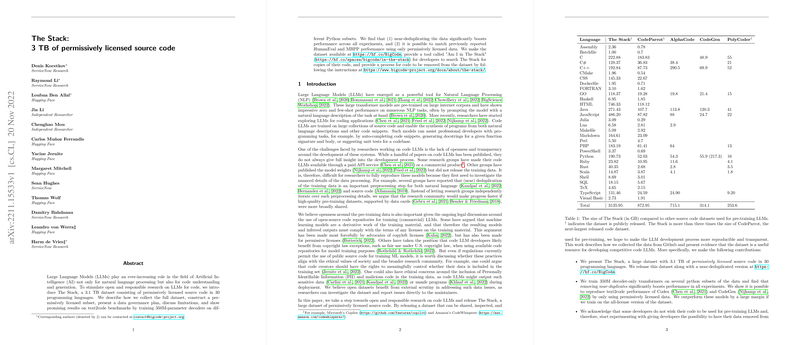An Analysis of "\datasetname: 3 TB of Permissively Licensed Source Code"
The paper introduces "\datasetname," a substantial dataset comprising 3.1 TB of source code data across 30 programming languages, all of which are permissively licensed. This endeavor is pivotal in promoting open and responsible research on LLMs tailored for code, an increasingly vital application of AI in automating and enhancing programming tasks. By facilitating access to vast and diverse datasets, the research community can better analyze, reproduce, and innovate upon existing models.
Core Contributions
The paper delineates several significant contributions to the field:
- Dataset Compilation and Accessibility: \datasetname provides a meticulously curated collection of permissively licensed code, accessible to the research community. This dataset serves as a foundation for developing and benchmarking code LLMs.
- Data Governance and Developer Autonomy: The authors have established a framework for data governance, allowing developers to remove their code from the dataset, echoing ongoing discussions about ethics in AI and data usage rights.
- Performance on Benchmarks: Significantly, the authors demonstrate that a subset of their dataset permits reproducing the results of prominent models like Codex and CodeGen on standard tests such as HumanEval and MBPP, even outperforming them when non-deduplicated data is leveraged.
- Effectiveness of Near-Deduplication: An intriguing finding of the research is the positive impact of near-deduplication on training dataset quality, resulting in notable performance improvements across evaluated benchmarks.
Methodology
The dataset was sourced primarily from GitHub repositories, focusing strictly on those with permissive licenses such as MIT and Apache 2.0. A robust licensing detection framework ensured compliance, minimizing ethical and legal risks involved in using open-source code for commercial or research purposes.
To enhance the dataset's utility, the authors implemented near-deduplication techniques to exclude repetitive content, which was identified as a common issue exacerbating performance metrics in code LLMs. This processing step not only refines the dataset but also exemplifies best practices in data handling, promoting efficient and ethical AI model training.
Implications and Future Directions
The implications of this research are multifold. Practically, \datasetname may serve as a resource for developing more efficient code completion tools and programming assistants capable of handling sophisticated tasks ranging from auto-completion to full program synthesis. Theoretically, the dataset's availability and the open dialogue about data governance and ethical AI development pave the way for more transparent and collaborative advancements in the field.
The research also lays ground for future studies into mitigating potential biases in training datasets, anticipating a broader representation of programming languages and styles. Furthermore, addressing challenges such as the inclusion of malicious or personally identifiable information remains a priority to uphold model integrity and ethical standards.
Conclusion
The introduction of \datasetname marks a substantial step toward fostering an environment of open, reproducible, and responsible AI research within code synthesis and understanding. By facilitating both access and control over training data, the authors support a community-driven approach to innovation in machine learning for software development. The findings not only elucidate the existing capabilities of LLMs but also suggest new directions for optimizing their performance and applicability.
